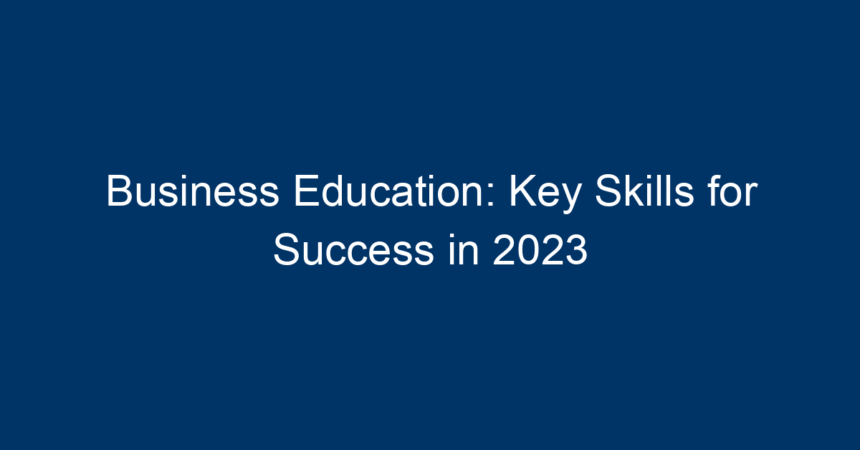In the rapidly evolving landscape of today’s corporate world, the importance of business education cannot be overstated. As industries adapt to changing technologies, consumer behavior, and global markets, the skills needed for success need to be equally dynamic. Whether you’re a seasoned professional looking to sharpen your skills or a fresh graduate stepping into the business realm, understanding the key competencies that drive success in 2023 is essential. This article delves into the critical skills that constitute effective business education, ensuring you’re well-equipped to meet the challenges of modern business.
The Importance of Business Education
Before we dive into specific skills, let’s briefly explore why business education is vital. Business education equips individuals with the theories, concepts, and practical skills necessary for various fields such as marketing, finance, management, and entrepreneurship. In 2023, organizations seek candidates who not only have technical knowledge but also soft skills that enhance team dynamics and innovation.
Evolving Landscape of Business Education
In recent years, business education has transitioned from traditional classroom settings to more dynamic, interactive, and technology-driven environments. Online courses, workshops, and certifications have emerged, allowing for a more personalized learning experience tailored to individual career goals. This shift emphasizes the importance of lifelong learning, making it essential for professionals to continually update their skills.
Key Skills for Success in Business Education
1. Critical Thinking and Problem Solving
In the fast-paced business world of 2023, the ability to analyze situations critically and make informed decisions is paramount. Critical thinking allows professionals to assess data, identify problems, and develop effective solutions. Business education programs focusing on case studies, simulations, and real-world problems enhance these skills, preparing students to navigate complex issues confidently.
2. Data Literacy
With the rise of big data and analytics, understanding how to interpret and leverage data is crucial for business success. Data literacy encompasses the ability to read, analyze, and utilize data to drive strategy and decision-making. Courses in business education that emphasize analytics tools, data visualization, and statistical methods empower students to harness data effectively, making them valuable assets in any organization.
3. Digital Proficiency
As technology continues to evolve, digital proficiency remains a key skill. Familiarity with various digital tools and platforms is essential for efficiency and productivity. Business education programs that integrate digital marketing, e-commerce, project management software, and collaboration tools prepare students to operate effectively in a tech-driven environment.
4. Communication Skills
Effective communication is foundational to business success. Whether it’s verbal, non-verbal, or written communication, the ability to convey ideas clearly and persuasively is invaluable. Business education emphasizes communication skills through presentations, group projects, and public speaking exercises, refining students’ abilities to articulate their thoughts in diverse settings.
5. Emotional Intelligence
In an age where teamwork and collaboration are essential, emotional intelligence (EI) stands out as a pivotal skill. EI involves the ability to understand and manage your own emotions, as well as empathize with others. Business education’s focus on interpersonal skills and conflict resolution helps students cultivate EI, enhancing their ability to work collaboratively and lead effectively.
6. Adaptability and Resilience
The only constant in business is change. In 2023, resilience and adaptability are crucial traits for navigating uncertainties, from market fluctuations to technological advancements. Business education that incorporates change management strategies and scenarios prepares students to embrace change and thrive despite challenges.
7. Leadership Skills
Leadership is not just for those in managerial positions. In today’s business environments, everyone is expected to demonstrate leadership qualities. Business education programs often include leadership development modules, allowing students to learn how to inspire, motivate, and guide teams toward common goals, regardless of their formal title.
8. Networking and Relationship Building
Building a robust professional network is essential for career growth. Effective business education programs emphasize the importance of networking through alumni events, industry conferences, and collaborations. These opportunities allow students to develop essential interpersonal skills while fostering connections that could lead to future job opportunities.
9. Financial Acumen
Understanding financial principles is fundamental in the business realm, regardless of your specific role. Financial acumen involves reading financial statements, understanding budgets, and making data-driven financial decisions. Business education equips students with the knowledge to navigate finance, ensuring they can contribute to an organization’s bottom line effectively.
10. Innovation and Creativity
The ability to think creatively and innovate is increasingly necessary in a competitive marketplace. Business education that encourages creative thinking, brainstorming, and problem-solving through varied assignments fosters innovation. This creative mindset is essential for developing new products, services, or strategies that can set a business apart.
The Role of Business Education in Skill Development
For professionals in 2023, continuous learning through business education is not just an option; it’s a necessity. Accreditations, certifications, and workshops provide avenues for staying updated with industry trends and acquiring new skills.
Online Learning Opportunities
The growth of online learning platforms has made business education more accessible than ever. These platforms offer courses tailored to specific skills, allowing individuals to learn at their own pace. This flexibility ensures that busy professionals can integrate learning into their schedules without compromising their existing commitments.
Choosing the Right Program
When considering business education, it’s essential to choose programs that align with your career goals. Look for institutions that emphasize experiential learning, opportunities for networking, and a curriculum that adapts to industry changes. Research and reviews can provide insights into the success of graduates and the relevance of the course material.
Conclusion: Empowering Your Career through Business Education
In 2023, the business landscape requires a diverse skill set that includes both hard and soft skills. By focusing on critical thinking, data literacy, digital proficiency, communication, emotional intelligence, adaptability, leadership, networking, financial acumen, and creativity, you equip yourself with the tools necessary for success.
Taking the time to invest in your business education can transform your career trajectory. Embrace learning opportunities, seek out professional development, and remain adaptable to change. Your commitment to continual growth will not only enhance your value in the workplace but also pave the way for long-term career success.
Actionable Insights
- Enroll in Courses: Identify areas for improvement and enroll in relevant courses or certification programs.
- Network Actively: Attend industry events and webinars to expand your professional network.
- Practice Critical Thinking: Engage in activities that challenge your problem-solving skills, such as case studies or group discussions.
- Foster Creativity: Set aside time for brainstorming sessions to enhance your creative thinking capabilities.
- Stay Updated: Follow industry trends through blogs, podcasts, and publications to remain informed and relevant.
By taking these steps, you can proactively shape your career and ensure you remain a competitive force in the evolving business landscape of 2023 and beyond.




